Reflective Practitioner Development: Challenges and Strategies Essay
VerifiedAdded on 2023/04/21
|8
|1793
|337
Essay
AI Summary
This essay provides a reflective discussion on the challenges faced by graduate nurses during their transition from an academic setting to a professional nursing environment. It highlights the author's experiences as a graduate nurse, focusing on the difficulties encountered such as adapting to a healthcare team, managing time efficiently, and handling patient care. The essay emphasizes the importance of professional development, including competency, interpersonal skills, and accountability, and discusses strategies like preceptor education programs and supportive nursing environments to overcome these challenges. Furthermore, the essay underscores the significance of professional accountability, decision-making skills, and adherence to regulatory guidelines in nursing practice, concluding that reflective practice is crucial for developing critical learning skills and identifying professional strengths among graduate nurses. This resource is contributed by a student and available on Desklib, a platform offering study tools for students.
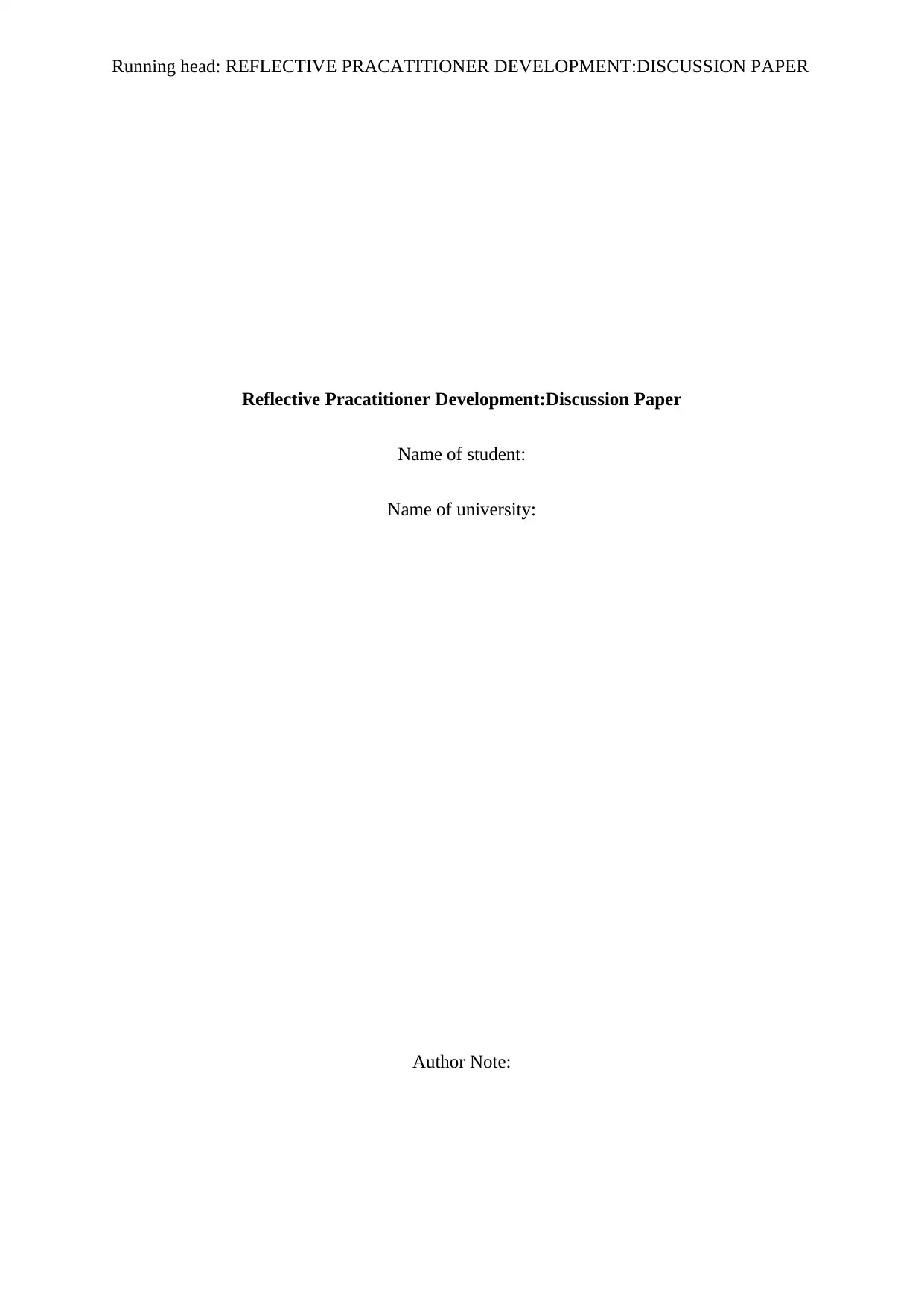
Running head: REFLECTIVE PRACATITIONER DEVELOPMENT:DISCUSSION PAPER
Reflective Pracatitioner Development:Discussion Paper
Name of student:
Name of university:
Author Note:
Reflective Pracatitioner Development:Discussion Paper
Name of student:
Name of university:
Author Note:
Paraphrase This Document
Need a fresh take? Get an instant paraphrase of this document with our AI Paraphraser
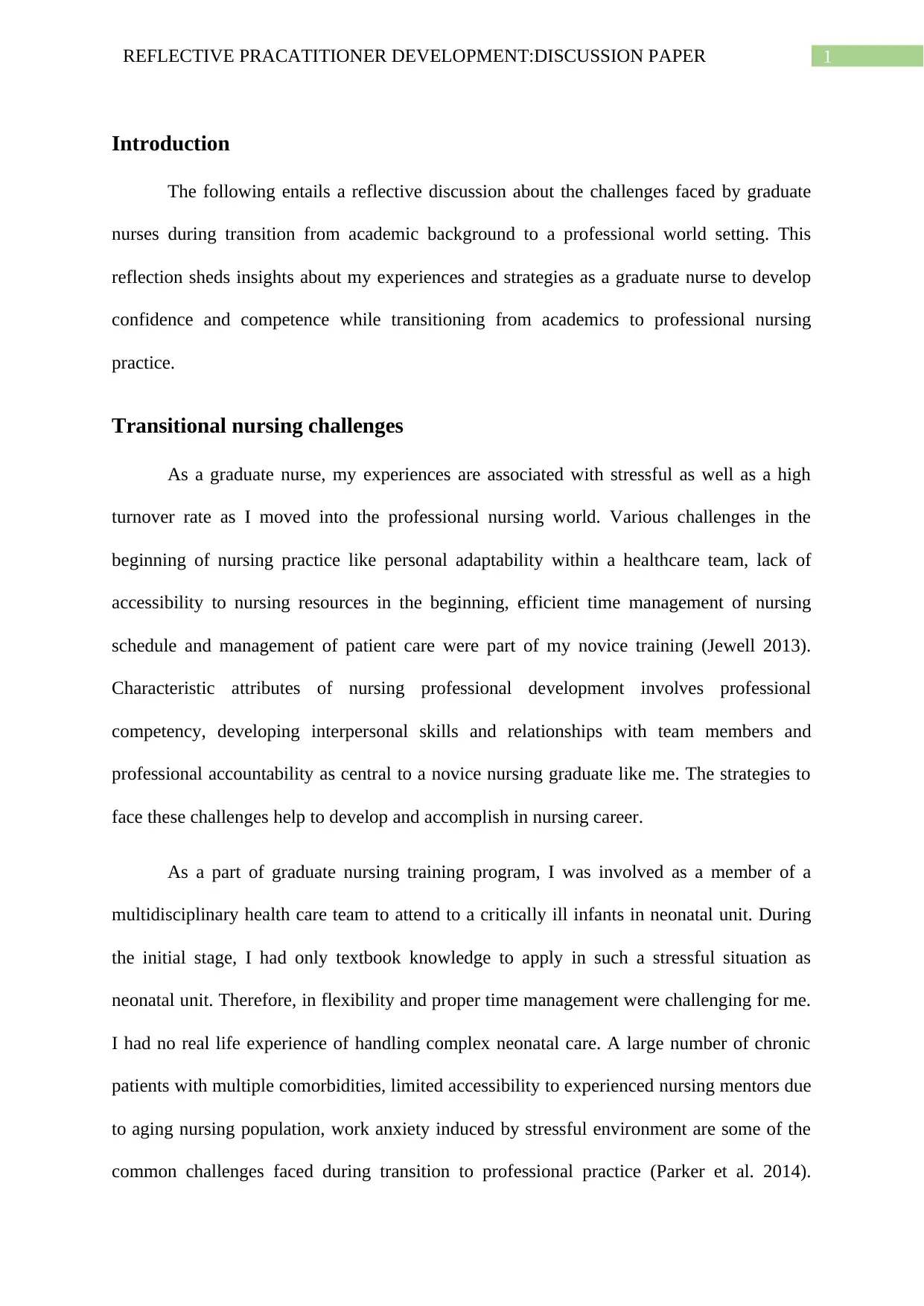
1REFLECTIVE PRACATITIONER DEVELOPMENT:DISCUSSION PAPER
Introduction
The following entails a reflective discussion about the challenges faced by graduate
nurses during transition from academic background to a professional world setting. This
reflection sheds insights about my experiences and strategies as a graduate nurse to develop
confidence and competence while transitioning from academics to professional nursing
practice.
Transitional nursing challenges
As a graduate nurse, my experiences are associated with stressful as well as a high
turnover rate as I moved into the professional nursing world. Various challenges in the
beginning of nursing practice like personal adaptability within a healthcare team, lack of
accessibility to nursing resources in the beginning, efficient time management of nursing
schedule and management of patient care were part of my novice training (Jewell 2013).
Characteristic attributes of nursing professional development involves professional
competency, developing interpersonal skills and relationships with team members and
professional accountability as central to a novice nursing graduate like me. The strategies to
face these challenges help to develop and accomplish in nursing career.
As a part of graduate nursing training program, I was involved as a member of a
multidisciplinary health care team to attend to a critically ill infants in neonatal unit. During
the initial stage, I had only textbook knowledge to apply in such a stressful situation as
neonatal unit. Therefore, in flexibility and proper time management were challenging for me.
I had no real life experience of handling complex neonatal care. A large number of chronic
patients with multiple comorbidities, limited accessibility to experienced nursing mentors due
to aging nursing population, work anxiety induced by stressful environment are some of the
common challenges faced during transition to professional practice (Parker et al. 2014).
Introduction
The following entails a reflective discussion about the challenges faced by graduate
nurses during transition from academic background to a professional world setting. This
reflection sheds insights about my experiences and strategies as a graduate nurse to develop
confidence and competence while transitioning from academics to professional nursing
practice.
Transitional nursing challenges
As a graduate nurse, my experiences are associated with stressful as well as a high
turnover rate as I moved into the professional nursing world. Various challenges in the
beginning of nursing practice like personal adaptability within a healthcare team, lack of
accessibility to nursing resources in the beginning, efficient time management of nursing
schedule and management of patient care were part of my novice training (Jewell 2013).
Characteristic attributes of nursing professional development involves professional
competency, developing interpersonal skills and relationships with team members and
professional accountability as central to a novice nursing graduate like me. The strategies to
face these challenges help to develop and accomplish in nursing career.
As a part of graduate nursing training program, I was involved as a member of a
multidisciplinary health care team to attend to a critically ill infants in neonatal unit. During
the initial stage, I had only textbook knowledge to apply in such a stressful situation as
neonatal unit. Therefore, in flexibility and proper time management were challenging for me.
I had no real life experience of handling complex neonatal care. A large number of chronic
patients with multiple comorbidities, limited accessibility to experienced nursing mentors due
to aging nursing population, work anxiety induced by stressful environment are some of the
common challenges faced during transition to professional practice (Parker et al. 2014).
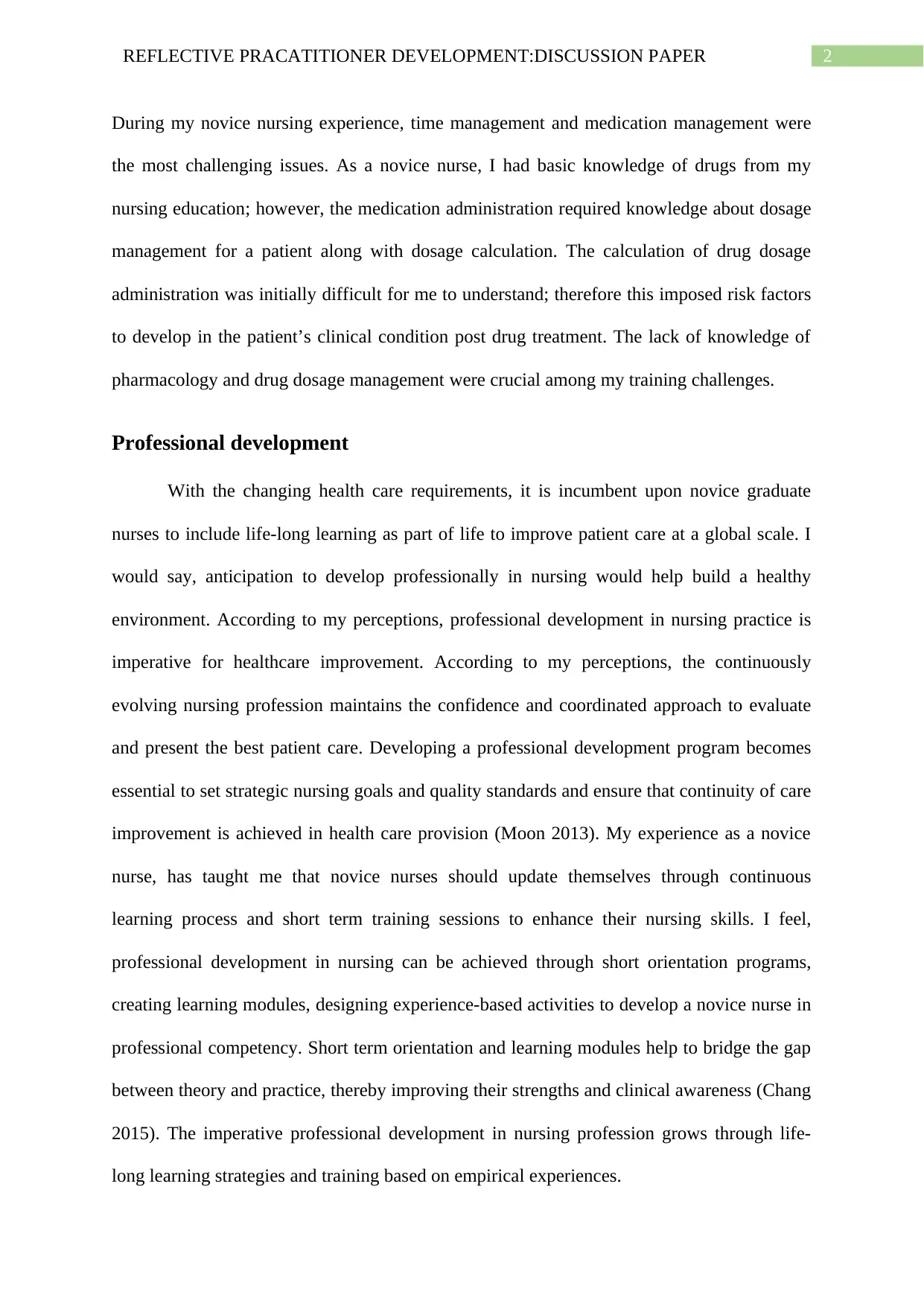
2REFLECTIVE PRACATITIONER DEVELOPMENT:DISCUSSION PAPER
During my novice nursing experience, time management and medication management were
the most challenging issues. As a novice nurse, I had basic knowledge of drugs from my
nursing education; however, the medication administration required knowledge about dosage
management for a patient along with dosage calculation. The calculation of drug dosage
administration was initially difficult for me to understand; therefore this imposed risk factors
to develop in the patient’s clinical condition post drug treatment. The lack of knowledge of
pharmacology and drug dosage management were crucial among my training challenges.
Professional development
With the changing health care requirements, it is incumbent upon novice graduate
nurses to include life-long learning as part of life to improve patient care at a global scale. I
would say, anticipation to develop professionally in nursing would help build a healthy
environment. According to my perceptions, professional development in nursing practice is
imperative for healthcare improvement. According to my perceptions, the continuously
evolving nursing profession maintains the confidence and coordinated approach to evaluate
and present the best patient care. Developing a professional development program becomes
essential to set strategic nursing goals and quality standards and ensure that continuity of care
improvement is achieved in health care provision (Moon 2013). My experience as a novice
nurse, has taught me that novice nurses should update themselves through continuous
learning process and short term training sessions to enhance their nursing skills. I feel,
professional development in nursing can be achieved through short orientation programs,
creating learning modules, designing experience-based activities to develop a novice nurse in
professional competency. Short term orientation and learning modules help to bridge the gap
between theory and practice, thereby improving their strengths and clinical awareness (Chang
2015). The imperative professional development in nursing profession grows through life-
long learning strategies and training based on empirical experiences.
During my novice nursing experience, time management and medication management were
the most challenging issues. As a novice nurse, I had basic knowledge of drugs from my
nursing education; however, the medication administration required knowledge about dosage
management for a patient along with dosage calculation. The calculation of drug dosage
administration was initially difficult for me to understand; therefore this imposed risk factors
to develop in the patient’s clinical condition post drug treatment. The lack of knowledge of
pharmacology and drug dosage management were crucial among my training challenges.
Professional development
With the changing health care requirements, it is incumbent upon novice graduate
nurses to include life-long learning as part of life to improve patient care at a global scale. I
would say, anticipation to develop professionally in nursing would help build a healthy
environment. According to my perceptions, professional development in nursing practice is
imperative for healthcare improvement. According to my perceptions, the continuously
evolving nursing profession maintains the confidence and coordinated approach to evaluate
and present the best patient care. Developing a professional development program becomes
essential to set strategic nursing goals and quality standards and ensure that continuity of care
improvement is achieved in health care provision (Moon 2013). My experience as a novice
nurse, has taught me that novice nurses should update themselves through continuous
learning process and short term training sessions to enhance their nursing skills. I feel,
professional development in nursing can be achieved through short orientation programs,
creating learning modules, designing experience-based activities to develop a novice nurse in
professional competency. Short term orientation and learning modules help to bridge the gap
between theory and practice, thereby improving their strengths and clinical awareness (Chang
2015). The imperative professional development in nursing profession grows through life-
long learning strategies and training based on empirical experiences.
⊘ This is a preview!⊘
Do you want full access?
Subscribe today to unlock all pages.

Trusted by 1+ million students worldwide
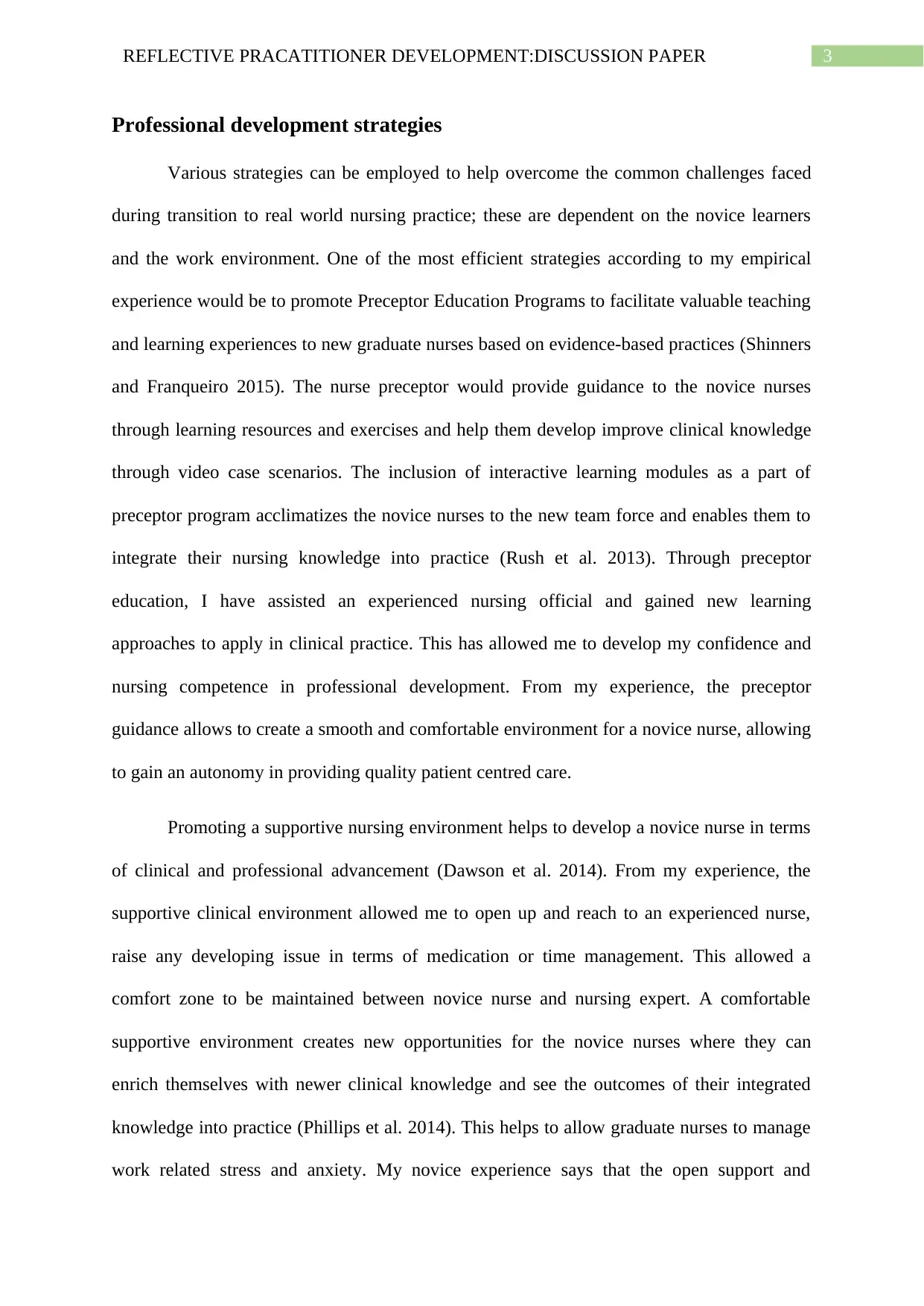
3REFLECTIVE PRACATITIONER DEVELOPMENT:DISCUSSION PAPER
Professional development strategies
Various strategies can be employed to help overcome the common challenges faced
during transition to real world nursing practice; these are dependent on the novice learners
and the work environment. One of the most efficient strategies according to my empirical
experience would be to promote Preceptor Education Programs to facilitate valuable teaching
and learning experiences to new graduate nurses based on evidence-based practices (Shinners
and Franqueiro 2015). The nurse preceptor would provide guidance to the novice nurses
through learning resources and exercises and help them develop improve clinical knowledge
through video case scenarios. The inclusion of interactive learning modules as a part of
preceptor program acclimatizes the novice nurses to the new team force and enables them to
integrate their nursing knowledge into practice (Rush et al. 2013). Through preceptor
education, I have assisted an experienced nursing official and gained new learning
approaches to apply in clinical practice. This has allowed me to develop my confidence and
nursing competence in professional development. From my experience, the preceptor
guidance allows to create a smooth and comfortable environment for a novice nurse, allowing
to gain an autonomy in providing quality patient centred care.
Promoting a supportive nursing environment helps to develop a novice nurse in terms
of clinical and professional advancement (Dawson et al. 2014). From my experience, the
supportive clinical environment allowed me to open up and reach to an experienced nurse,
raise any developing issue in terms of medication or time management. This allowed a
comfort zone to be maintained between novice nurse and nursing expert. A comfortable
supportive environment creates new opportunities for the novice nurses where they can
enrich themselves with newer clinical knowledge and see the outcomes of their integrated
knowledge into practice (Phillips et al. 2014). This helps to allow graduate nurses to manage
work related stress and anxiety. My novice experience says that the open support and
Professional development strategies
Various strategies can be employed to help overcome the common challenges faced
during transition to real world nursing practice; these are dependent on the novice learners
and the work environment. One of the most efficient strategies according to my empirical
experience would be to promote Preceptor Education Programs to facilitate valuable teaching
and learning experiences to new graduate nurses based on evidence-based practices (Shinners
and Franqueiro 2015). The nurse preceptor would provide guidance to the novice nurses
through learning resources and exercises and help them develop improve clinical knowledge
through video case scenarios. The inclusion of interactive learning modules as a part of
preceptor program acclimatizes the novice nurses to the new team force and enables them to
integrate their nursing knowledge into practice (Rush et al. 2013). Through preceptor
education, I have assisted an experienced nursing official and gained new learning
approaches to apply in clinical practice. This has allowed me to develop my confidence and
nursing competence in professional development. From my experience, the preceptor
guidance allows to create a smooth and comfortable environment for a novice nurse, allowing
to gain an autonomy in providing quality patient centred care.
Promoting a supportive nursing environment helps to develop a novice nurse in terms
of clinical and professional advancement (Dawson et al. 2014). From my experience, the
supportive clinical environment allowed me to open up and reach to an experienced nurse,
raise any developing issue in terms of medication or time management. This allowed a
comfort zone to be maintained between novice nurse and nursing expert. A comfortable
supportive environment creates new opportunities for the novice nurses where they can
enrich themselves with newer clinical knowledge and see the outcomes of their integrated
knowledge into practice (Phillips et al. 2014). This helps to allow graduate nurses to manage
work related stress and anxiety. My novice experience says that the open support and
Paraphrase This Document
Need a fresh take? Get an instant paraphrase of this document with our AI Paraphraser
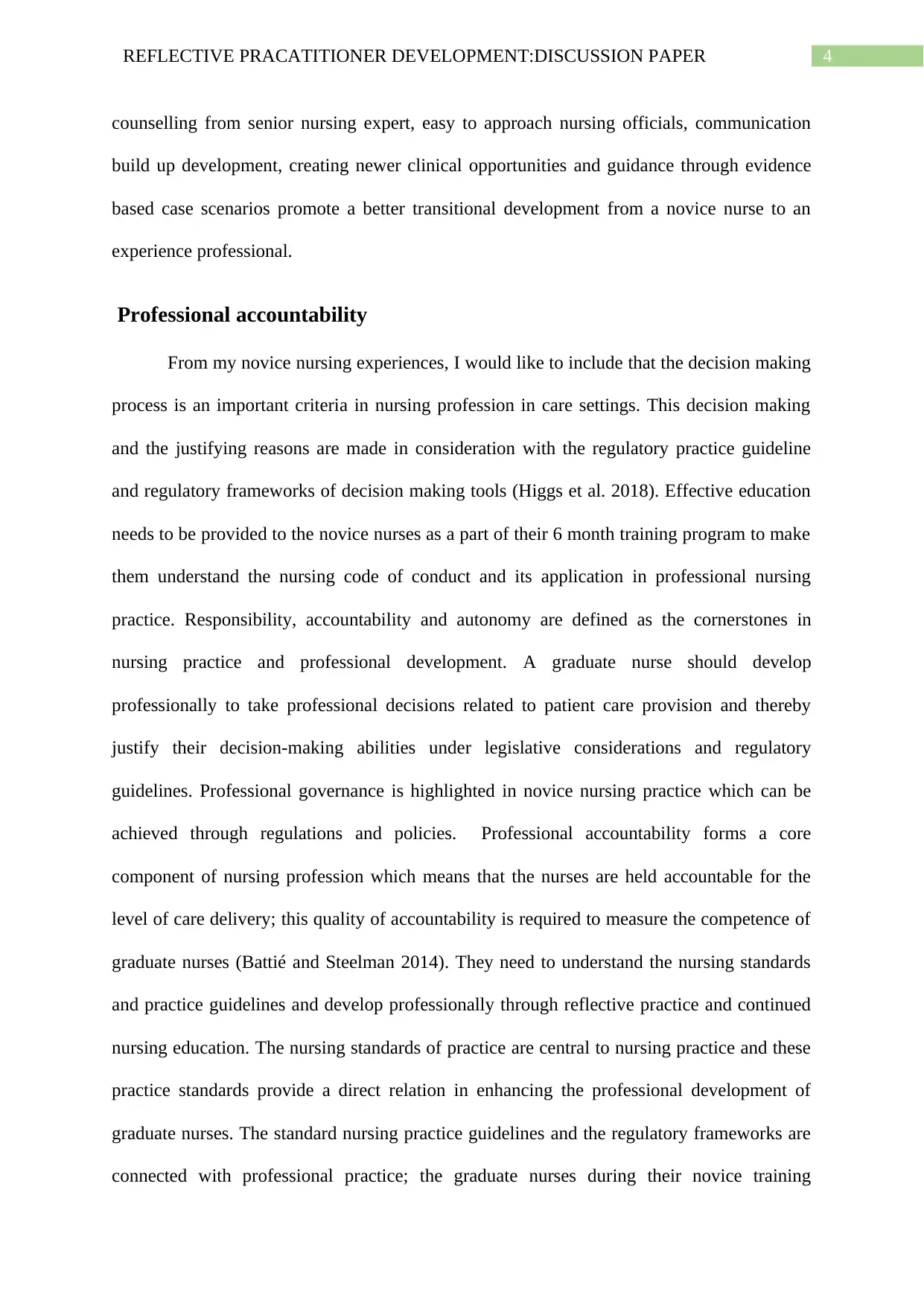
4REFLECTIVE PRACATITIONER DEVELOPMENT:DISCUSSION PAPER
counselling from senior nursing expert, easy to approach nursing officials, communication
build up development, creating newer clinical opportunities and guidance through evidence
based case scenarios promote a better transitional development from a novice nurse to an
experience professional.
Professional accountability
From my novice nursing experiences, I would like to include that the decision making
process is an important criteria in nursing profession in care settings. This decision making
and the justifying reasons are made in consideration with the regulatory practice guideline
and regulatory frameworks of decision making tools (Higgs et al. 2018). Effective education
needs to be provided to the novice nurses as a part of their 6 month training program to make
them understand the nursing code of conduct and its application in professional nursing
practice. Responsibility, accountability and autonomy are defined as the cornerstones in
nursing practice and professional development. A graduate nurse should develop
professionally to take professional decisions related to patient care provision and thereby
justify their decision-making abilities under legislative considerations and regulatory
guidelines. Professional governance is highlighted in novice nursing practice which can be
achieved through regulations and policies. Professional accountability forms a core
component of nursing profession which means that the nurses are held accountable for the
level of care delivery; this quality of accountability is required to measure the competence of
graduate nurses (Battié and Steelman 2014). They need to understand the nursing standards
and practice guidelines and develop professionally through reflective practice and continued
nursing education. The nursing standards of practice are central to nursing practice and these
practice standards provide a direct relation in enhancing the professional development of
graduate nurses. The standard nursing practice guidelines and the regulatory frameworks are
connected with professional practice; the graduate nurses during their novice training
counselling from senior nursing expert, easy to approach nursing officials, communication
build up development, creating newer clinical opportunities and guidance through evidence
based case scenarios promote a better transitional development from a novice nurse to an
experience professional.
Professional accountability
From my novice nursing experiences, I would like to include that the decision making
process is an important criteria in nursing profession in care settings. This decision making
and the justifying reasons are made in consideration with the regulatory practice guideline
and regulatory frameworks of decision making tools (Higgs et al. 2018). Effective education
needs to be provided to the novice nurses as a part of their 6 month training program to make
them understand the nursing code of conduct and its application in professional nursing
practice. Responsibility, accountability and autonomy are defined as the cornerstones in
nursing practice and professional development. A graduate nurse should develop
professionally to take professional decisions related to patient care provision and thereby
justify their decision-making abilities under legislative considerations and regulatory
guidelines. Professional governance is highlighted in novice nursing practice which can be
achieved through regulations and policies. Professional accountability forms a core
component of nursing profession which means that the nurses are held accountable for the
level of care delivery; this quality of accountability is required to measure the competence of
graduate nurses (Battié and Steelman 2014). They need to understand the nursing standards
and practice guidelines and develop professionally through reflective practice and continued
nursing education. The nursing standards of practice are central to nursing practice and these
practice standards provide a direct relation in enhancing the professional development of
graduate nurses. The standard nursing practice guidelines and the regulatory frameworks are
connected with professional practice; the graduate nurses during their novice training
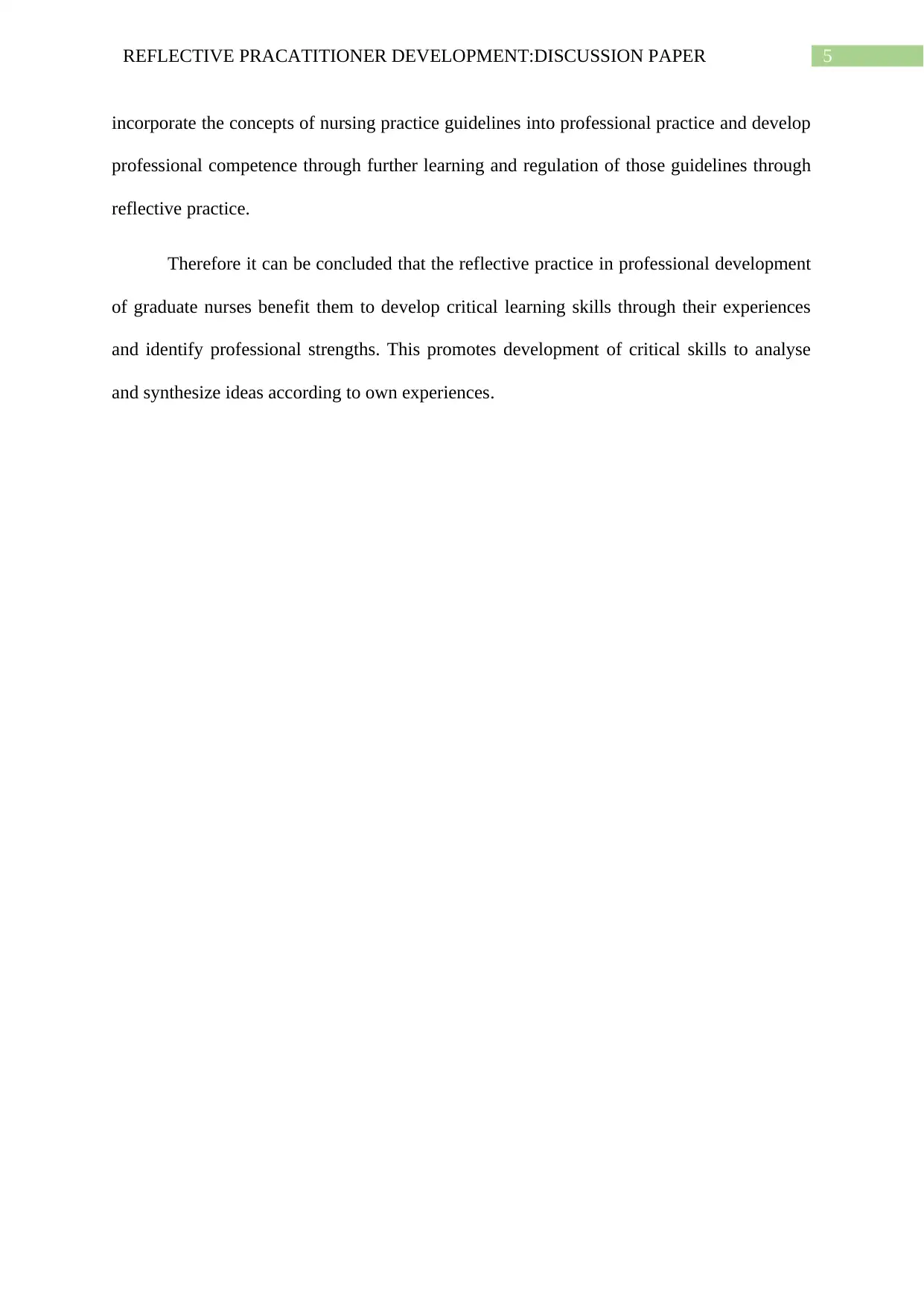
5REFLECTIVE PRACATITIONER DEVELOPMENT:DISCUSSION PAPER
incorporate the concepts of nursing practice guidelines into professional practice and develop
professional competence through further learning and regulation of those guidelines through
reflective practice.
Therefore it can be concluded that the reflective practice in professional development
of graduate nurses benefit them to develop critical learning skills through their experiences
and identify professional strengths. This promotes development of critical skills to analyse
and synthesize ideas according to own experiences.
incorporate the concepts of nursing practice guidelines into professional practice and develop
professional competence through further learning and regulation of those guidelines through
reflective practice.
Therefore it can be concluded that the reflective practice in professional development
of graduate nurses benefit them to develop critical learning skills through their experiences
and identify professional strengths. This promotes development of critical skills to analyse
and synthesize ideas according to own experiences.
⊘ This is a preview!⊘
Do you want full access?
Subscribe today to unlock all pages.

Trusted by 1+ million students worldwide
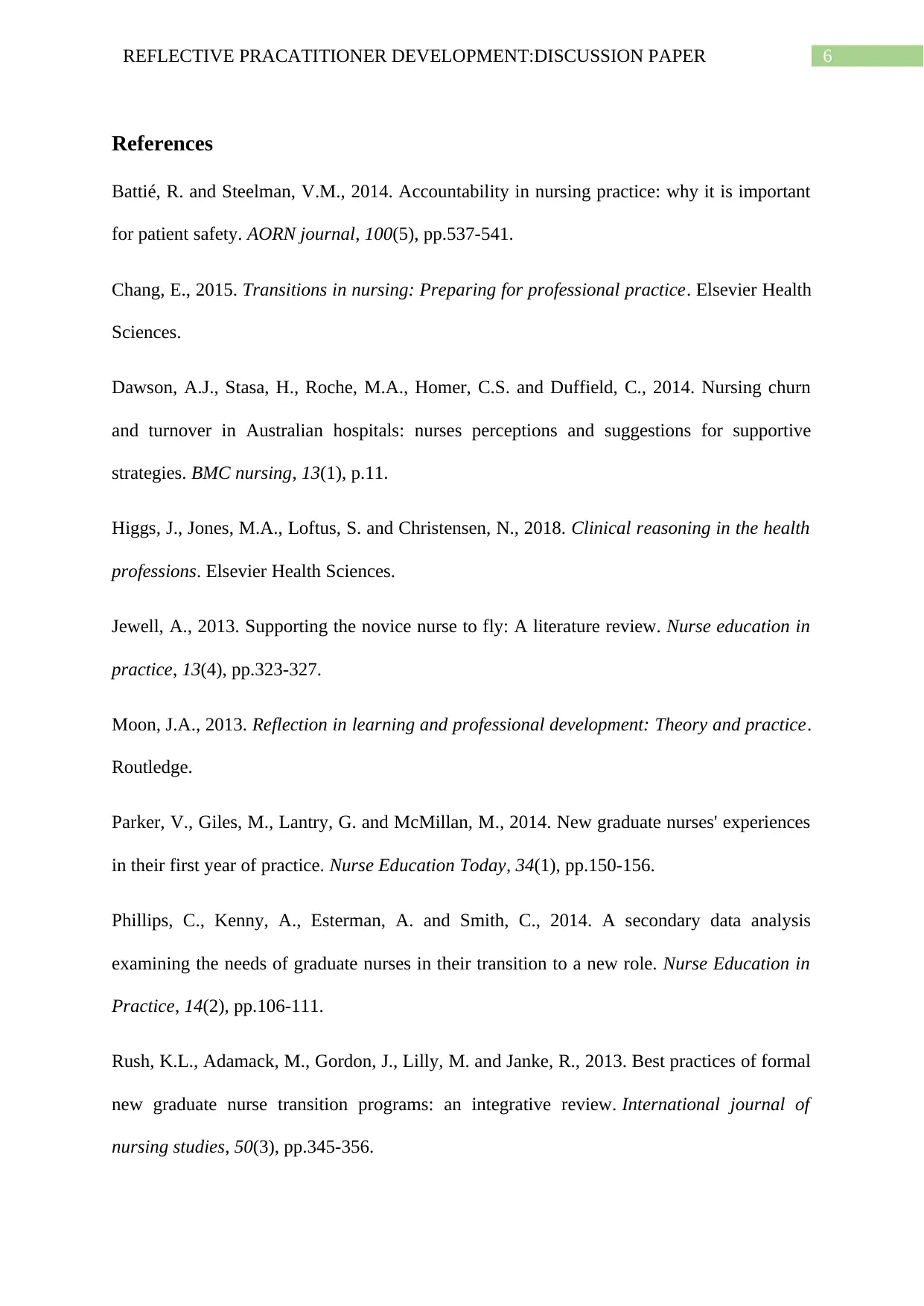
6REFLECTIVE PRACATITIONER DEVELOPMENT:DISCUSSION PAPER
References
Battié, R. and Steelman, V.M., 2014. Accountability in nursing practice: why it is important
for patient safety. AORN journal, 100(5), pp.537-541.
Chang, E., 2015. Transitions in nursing: Preparing for professional practice. Elsevier Health
Sciences.
Dawson, A.J., Stasa, H., Roche, M.A., Homer, C.S. and Duffield, C., 2014. Nursing churn
and turnover in Australian hospitals: nurses perceptions and suggestions for supportive
strategies. BMC nursing, 13(1), p.11.
Higgs, J., Jones, M.A., Loftus, S. and Christensen, N., 2018. Clinical reasoning in the health
professions. Elsevier Health Sciences.
Jewell, A., 2013. Supporting the novice nurse to fly: A literature review. Nurse education in
practice, 13(4), pp.323-327.
Moon, J.A., 2013. Reflection in learning and professional development: Theory and practice.
Routledge.
Parker, V., Giles, M., Lantry, G. and McMillan, M., 2014. New graduate nurses' experiences
in their first year of practice. Nurse Education Today, 34(1), pp.150-156.
Phillips, C., Kenny, A., Esterman, A. and Smith, C., 2014. A secondary data analysis
examining the needs of graduate nurses in their transition to a new role. Nurse Education in
Practice, 14(2), pp.106-111.
Rush, K.L., Adamack, M., Gordon, J., Lilly, M. and Janke, R., 2013. Best practices of formal
new graduate nurse transition programs: an integrative review. International journal of
nursing studies, 50(3), pp.345-356.
References
Battié, R. and Steelman, V.M., 2014. Accountability in nursing practice: why it is important
for patient safety. AORN journal, 100(5), pp.537-541.
Chang, E., 2015. Transitions in nursing: Preparing for professional practice. Elsevier Health
Sciences.
Dawson, A.J., Stasa, H., Roche, M.A., Homer, C.S. and Duffield, C., 2014. Nursing churn
and turnover in Australian hospitals: nurses perceptions and suggestions for supportive
strategies. BMC nursing, 13(1), p.11.
Higgs, J., Jones, M.A., Loftus, S. and Christensen, N., 2018. Clinical reasoning in the health
professions. Elsevier Health Sciences.
Jewell, A., 2013. Supporting the novice nurse to fly: A literature review. Nurse education in
practice, 13(4), pp.323-327.
Moon, J.A., 2013. Reflection in learning and professional development: Theory and practice.
Routledge.
Parker, V., Giles, M., Lantry, G. and McMillan, M., 2014. New graduate nurses' experiences
in their first year of practice. Nurse Education Today, 34(1), pp.150-156.
Phillips, C., Kenny, A., Esterman, A. and Smith, C., 2014. A secondary data analysis
examining the needs of graduate nurses in their transition to a new role. Nurse Education in
Practice, 14(2), pp.106-111.
Rush, K.L., Adamack, M., Gordon, J., Lilly, M. and Janke, R., 2013. Best practices of formal
new graduate nurse transition programs: an integrative review. International journal of
nursing studies, 50(3), pp.345-356.
Paraphrase This Document
Need a fresh take? Get an instant paraphrase of this document with our AI Paraphraser
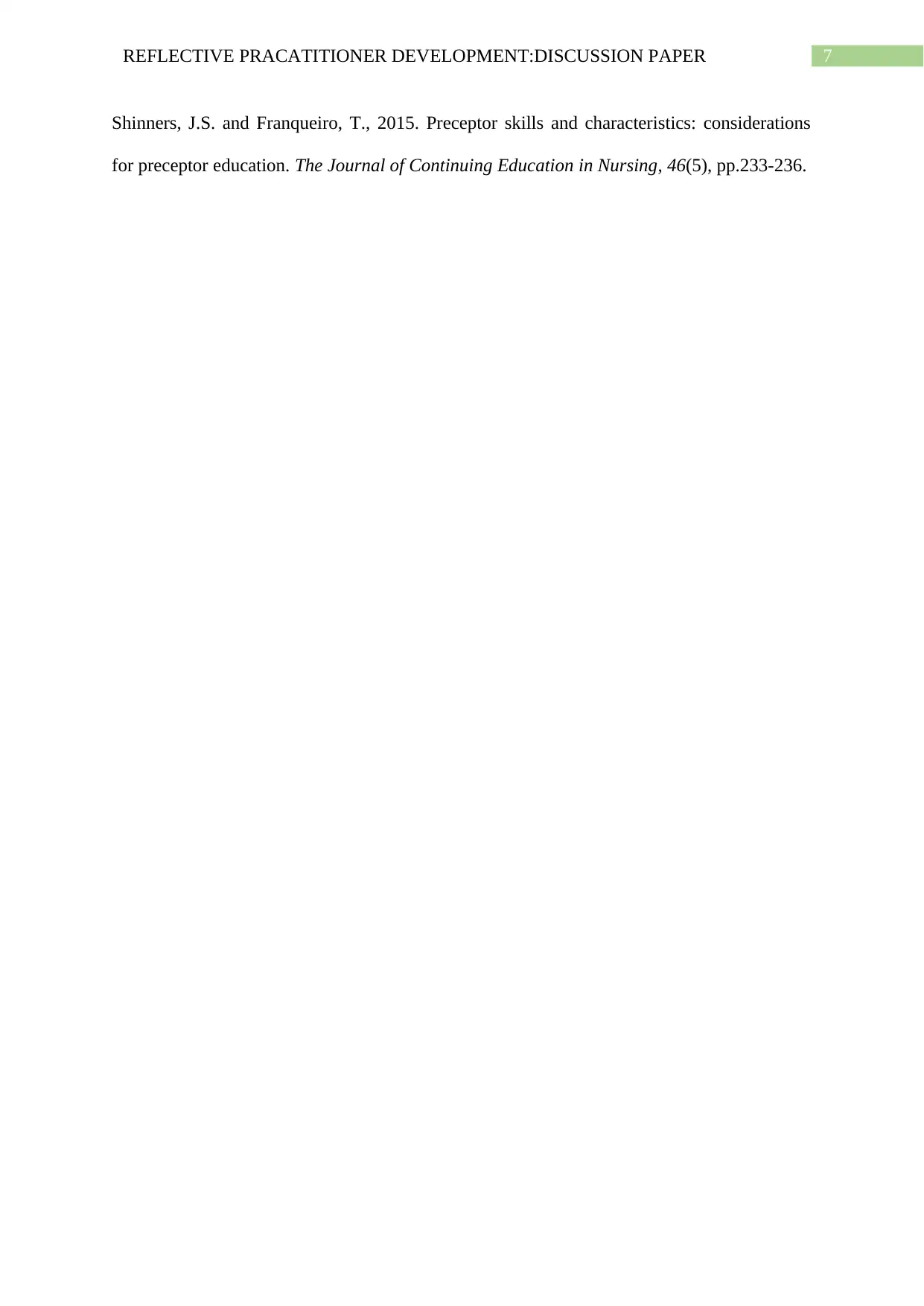
7REFLECTIVE PRACATITIONER DEVELOPMENT:DISCUSSION PAPER
Shinners, J.S. and Franqueiro, T., 2015. Preceptor skills and characteristics: considerations
for preceptor education. The Journal of Continuing Education in Nursing, 46(5), pp.233-236.
Shinners, J.S. and Franqueiro, T., 2015. Preceptor skills and characteristics: considerations
for preceptor education. The Journal of Continuing Education in Nursing, 46(5), pp.233-236.
1 out of 8
Related Documents
Your All-in-One AI-Powered Toolkit for Academic Success.
+13062052269
info@desklib.com
Available 24*7 on WhatsApp / Email
![[object Object]](/_next/static/media/star-bottom.7253800d.svg)
Unlock your academic potential
Copyright © 2020–2026 A2Z Services. All Rights Reserved. Developed and managed by ZUCOL.





